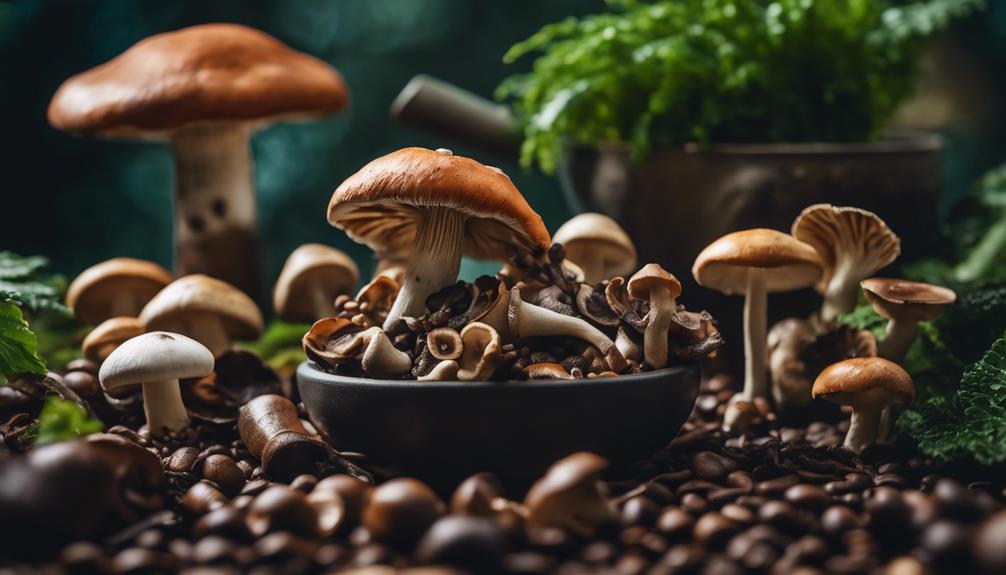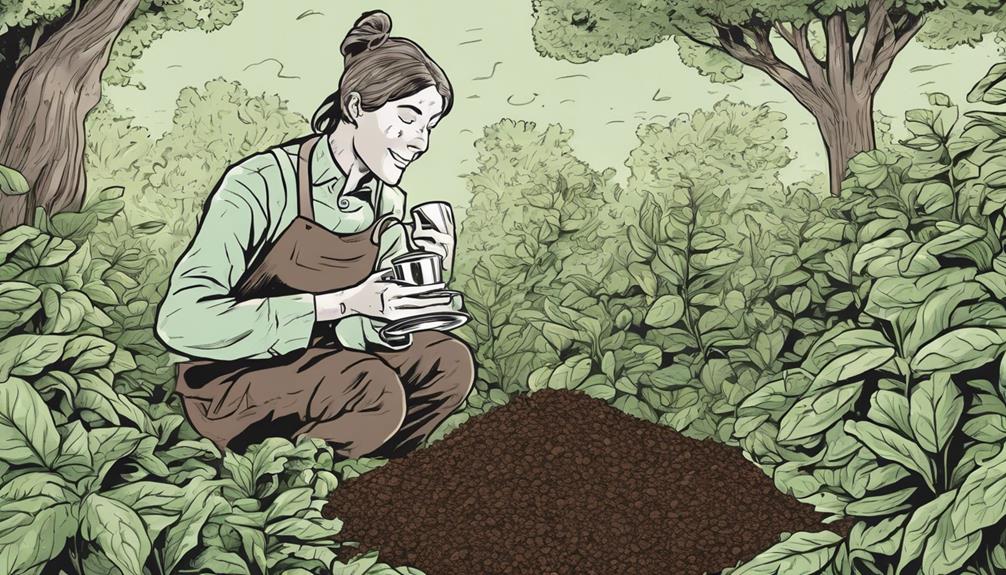Consider mushroom coffee for its notable health benefits. This unique blend combines the bold flavors of regular coffee with medicinal mushrooms like reishi and lion’s mane. With lower caffeine content, it provides a smoother alternative that can help reduce jitters and improve sleep quality. Additionally, it is packed with antioxidants, vitamins, and immune-boosting properties. Not only does it support cognitive function and reduce stress, but it also has potential benefits for your overall well-being. However, if you have mushroom allergies or digestive sensitivities, it may not be the best choice for you. There is much more to explore about this intriguing beverage and its impact on your journey to wellness.
Key Takeaways
- Mushroom coffee offers lower caffeine content, reducing jitters while maintaining a traditional coffee flavor.
- It contains antioxidants and essential vitamins that enhance immune support and reduce inflammation.
- Bioactive compounds in mushrooms may improve cognitive function and focus, promoting overall wellness.
- Regular consumption may aid digestion and help regulate stress and cortisol levels due to its adaptogenic properties.
What Is Mushroom Coffee?
Mushroom coffee blends ground medicinal mushrooms like reishi and lion's mane with coffee beans to create a flavorful drink that offers a unique twist on your morning routine. This beverage not only retains the traditional coffee flavor you love but also introduces the health benefits of medicinal mushrooms. The mushrooms are dried and ground into a fine powder, allowing you to enjoy the beneficial compounds without any visible mushroom pieces.
One of the appealing aspects of mushroom coffee is its lower caffeine content compared to traditional coffee. If you're sensitive to caffeine but still want a mild energy boost, this drink could be the perfect solution. You can savor the rich, earthy taste while enjoying a smoother experience that won't leave you jittery.
Mushroom coffee is increasingly popular, reflected in over 17.1K posts on TikTok under the hashtag #mushroomcoffee. It's available in various forms, including instant packets, coffee grounds, and lattes, catering to your individual preferences. Whether you're looking to switch up your morning routine or explore new flavors, mushroom coffee offers a delightful option worth trying.
Health Benefits of Mushroom Coffee

Drinking mushroom coffee can offer a range of health benefits, thanks to its blend of medicinal mushrooms rich in antioxidants and other nutrients. These mushrooms, like reishi and lion's mane, can enhance your immune system and reduce inflammation, making you feel better overall.
With lower caffeine content—around 50 mg—compared to regular coffee, mushroom coffee can help you avoid jitteriness and improve your sleep quality, especially if you're sensitive to caffeine.
The adaptogens found in these mushrooms can help balance cortisol, the stress hormone, potentially alleviating stress and promoting a sense of well-being. You might also find that mushroom coffee supports heart health, as compounds like polysaccharides and polyphenols may reduce the risk of chronic diseases.
Additionally, anecdotal evidence suggests that mushroom coffee can enhance cognitive function, focus, and concentration, particularly due to lion's mane. With its impressive antioxidant properties and potential mental clarity benefits, mushroom coffee could be a smart addition to your daily routine, offering you not just a tasty drink but a boost to your overall health.
Types of Mushrooms Used

Several types of medicinal mushrooms are commonly used in mushroom coffee, each offering unique health benefits that enhance your overall well-being.
One standout is lion's mane, known for its potential cognitive benefits. It may help promote nerve growth, improving your mental clarity and focus.
Reishi, often called the 'mushroom of immortality,' is another popular choice. It's recognized for its immune-supporting properties and ability to help balance stress levels, making it a great addition for those looking to boost their immune system.
Chaga is rich in antioxidants and traditionally utilized for its potential to support immune function and reduce inflammation, promoting overall health.
If you're seeking an energy boost, cordyceps is known for its energizing effects, potentially improving your athletic performance and stamina while enhancing oxygen utilization in your body.
Lastly, turkey tail is valued for its immune-boosting properties. It's rich in polysaccharides, particularly PSK and PSP, which are studied for their potential anti-cancer effects.
Each of these mushrooms brings distinct benefits, making mushroom coffee not just a tasty alternative but also a nourishing choice for your health.
Potential Downsides of Mushroom Coffee

While the benefits of various medicinal mushrooms in coffee are appealing, there are potential downsides that consumers should consider before making it a regular part of their diet. You may experience digestive issues, especially if you have pre-existing kidney or digestive problems due to the extracts used in mushroom coffee. Certain mushrooms, like chaga, contain high oxalates, which can elevate your risk of kidney stones if consumed excessively.
Here's a quick overview of some potential downsides:
| Potential Downsides | Description | Considerations |
|---|---|---|
| Kidney Issues | High oxalate levels can lead to kidney stones. | Consult with a healthcare provider. |
| Digestive Issues | Some may experience discomfort or upset stomach. | Start with small amounts. |
| Mushroom Allergies | Allergic reactions can occur in sensitive individuals. | Always check for allergies first. |
It's also worth noting that mushroom coffee is generally more expensive than regular coffee, which can add up over time. While it offers health benefits, the nutritional advantages of whole mushrooms may outweigh those of the processed coffee form.
Nutritional Components of Mushrooms

Mushrooms pack a powerful nutritional punch that can boost your health in various ways.
They're loaded with antioxidants, essential vitamins, and minerals that support your immune system and overall well-being.
Plus, their unique compounds can help regulate stress and improve gut health, making them a great addition to your diet.
Nutrient-Rich Mushroom Profile
Packed with essential nutrients, mushrooms provide a wealth of health benefits that can enhance your overall well-being. Their impressive nutritional profile includes crucial vitamins and minerals like B vitamins, vitamin D, selenium, and potassium, all of which play significant roles in maintaining bodily functions.
Additionally, mushrooms are rich in antioxidants, which help combat oxidative stress and support your health by neutralizing free radicals in your body.
One of the standout features of mushrooms is their polysaccharides, particularly beta-glucans, which are known to support your immune system by boosting the activity of immune cells. If you're looking to manage stress, mushrooms offer adaptogenic properties that may help regulate your body's response to stressors, potentially balancing cortisol levels and improving your resilience.
Moreover, the fiber content in mushrooms promotes digestive health, aiding in digestion and maintaining a healthy gut.
Antioxidant Properties Explained
Antioxidants in mushrooms play a crucial role in fighting oxidative stress and enhancing your overall health. These powerful compounds, including polyphenols and carotenoids, help to combat inflammation and support your immune system. By neutralizing free radicals, antioxidants found in mushrooms can reduce cellular damage and promote health benefits that extend beyond the plate.
| Type of Mushroom | Antioxidant Level | Health Benefits |
|---|---|---|
| Chaga | High | Protects cells, reduces inflammation |
| Reishi | Moderate | Supports heart health, boosts wellness |
| Shiitake | Moderate | Enhances circulation, fights oxidative stress |
Incorporating mushrooms into your diet, particularly through mushroom coffee, offers a convenient way to enjoy these antioxidants. Regular consumption can complement your balanced diet, aiding in overall wellness. The antioxidant properties in mushrooms not only contribute to better heart health but also play a significant role in maintaining a resilient immune system. So, when you sip on that mushroom coffee, remember you're doing more than just enjoying a beverage; you're investing in your health!
Immune System Support
Incorporating mushrooms into your diet, especially through mushroom coffee, not only boosts your antioxidant intake but also provides essential nutritional components that support your immune system.
The benefits of mushroom coffee stem from its rich content of polysaccharides, which enhance immune system function by promoting the activity of immune cells. Mushrooms like reishi and chaga are packed with antioxidants, helping to combat oxidative stress and contributing to overall immune health.
Moreover, polyphenols found in mushrooms may support immune responses and reduce inflammation, further aiding your body's defense mechanisms. Regular consumption of mushroom coffee can also supply important vitamins and minerals, such as B vitamins and selenium, necessary for maintaining a robust immune system.
Additionally, the adaptogenic properties of certain mushrooms, like lion's mane, help regulate your body's stress response, indirectly supporting immune function.
Current Research on Mushroom Coffee

Current studies on mushroom coffee are sparse, primarily focusing on the benefits of individual mushroom varieties rather than the coffee itself. Preliminary studies indicate that reishi mushrooms might enhance immune cell activity and improve cholesterol levels. However, more research is needed to confirm these effects specifically related to mushroom coffee.
Lion's mane mushrooms have shown potential in reducing tumor growth in animal studies, yet the implications for your mushroom coffee consumption remain unclear. While some anecdotal evidence suggests that adding mushrooms to your diet through coffee could enhance cognitive function and focus, rigorous scientific validation is necessary to back these claims.
Currently, the research on mushroom coffee is vital to establish its health benefits and safety profile. It's important to explore how these mushrooms interact with medications and what potential side effects of mushrooms could arise.
As ongoing studies unfold, you'll want to stay informed about the emerging evidence surrounding mushroom coffee. Until more conclusive findings are available, it's wise to approach mushroom coffee with both curiosity and caution, keeping an eye on reputable sources for updates on its health benefits and risks.
Risks and Side Effects

When trying mushroom coffee, you should be aware of potential digestive issues that can arise, especially if you have existing health concerns.
Additionally, the high oxalate levels in some mushrooms may raise the risk of kidney stones if consumed excessively.
It's essential to monitor your body's reactions and consult a healthcare provider to guarantee it's a safe addition to your diet.
Potential Digestive Issues
Some people may face digestive issues after trying mushroom coffee, especially if they have existing kidney or digestive conditions. Certain mushroom extracts, particularly chaga, can lead to gastrointestinal disturbances like bloating or upset stomach. If you're sensitive to mushrooms, you might experience allergic reactions that exacerbate these symptoms.
It's important to recognize that mushroom coffee often contains caffeine, which can also impact your digestive system. For individuals with pre-existing health conditions, mixing mushroom coffee into your diet could pose risks. If you're on medications, it's essential to consult your healthcare provider before making any changes, as mushroom coffee might interact with certain treatments.
Monitoring your body's response is crucial. If you notice discomfort after trying mushroom coffee, it's wise to reconsider its place in your routine. Always remember that every person's body reacts differently, so being cautious is key. If you have concerns about your kidney health or digestive system, discussing them with a healthcare professional can help you make informed decisions about including mushroom coffee in your diet.
Kidney Stone Risk
Mushroom coffee can pose a kidney stone risk due to the high oxalate levels found in certain mushrooms, like chaga. These oxalates can contribute to the formation of kidney stones, particularly in individuals who are already susceptible. If you have pre-existing kidney issues or a history of kidney stones, it is crucial to approach mushroom coffee with caution.
Excessive consumption of chaga has been linked to oxalate nephropathy and acute kidney injury in some cases. Consequently, it is advisable to consult a healthcare provider before adding mushroom coffee to your routine, especially if you're on medications or have underlying health conditions. Monitoring your individual reactions and limiting your intake can help mitigate potential side effects related to kidney health.
| Risk Factor | Recommendation |
|---|---|
| High oxalate levels | Limit consumption of chaga |
| Pre-existing kidney issues | Consult a healthcare provider |
| History of kidney stones | Monitor intake and reactions |
| Excessive consumption | Avoid high doses of mushroom coffee |
| Overall health benefits | Weigh against potential risks |
Understanding these risks can help you enjoy the health benefits of mushroom coffee safely.
Nutritional Limitations Explained
While mushroom coffee can offer health benefits, it also comes with nutritional limitations and potential side effects that you should consider before making it a regular part of your diet. Here are three key points to keep in mind: First, mushroom coffee is often made with chaga mushrooms, which have been shown to have antioxidant and anti-inflammatory properties. These benefits can help support overall health and well-being. However, it’s important to note that chaga mushroom coffee benefits may not be as potent as those of consuming the mushroom in its whole form or in a concentrated supplement. Additionally, some people may experience digestive issues or allergic reactions to mushrooms, so it’s crucial to be mindful of your individual tolerance and sensitivities.
- Digestive Issues: If you have pre-existing kidney or digestive problems, the extracts in mushroom coffee could lead to discomfort or exacerbate your condition.
- Oxalate Levels: Certain mushrooms, like chaga, contain high levels of oxalates, which may increase your risk of developing kidney stones if you're susceptible.
- Nutritional Advantages of Whole Mushrooms: Whole mushrooms provide essential nutrients such as B vitamins, vitamin D, selenium, and potassium, which are often absent in mushroom coffee.
Before you explore mushroom coffee, remember its cost is typically about twice that of regular coffee. If you're on medications, especially anticoagulants or those affecting blood sugar, it's best to consult with healthcare providers to avoid any potential interactions.
Weigh the health benefits of mushroom coffee against these nutritional limitations to make an informed choice.
Who Should Try Mushroom Coffee?

If you're looking for a lower-caffeine alternative to regular coffee, mushroom coffee might be worth a try. With about 50 mg of caffeine compared to traditional coffee's higher levels, it offers a gentler option for caffeine-sensitive individuals. Health enthusiasts often seek out mushroom coffee for its potential health benefits, particularly its immune support and stress-reducing properties.
If you tend to experience jitters or anxiety from regular coffee, mushroom coffee's adaptogenic properties can help manage stress and balance cortisol levels. Additionally, if you're aiming to enhance your cognitive function and focus, varieties enriched with lion's mane mushrooms are particularly appealing due to their traditional association with cognitive health.
However, caution is essential for those with mushroom allergies or specific health conditions. It's wise to consult with healthcare providers before diving into mushroom coffee, especially if you're on medications or have existing health concerns.
How to Incorporate Mushroom Coffee

Incorporating mushroom coffee into your daily routine can be as simple as swapping it for your regular brew in the morning. With about 50 mg of caffeine, it offers a gentler energy boost without the jitters. Here are three easy ways to enjoy its health benefits:
- Morning Swap: Replace your traditional coffee with mushroom coffee to kickstart your day. You'll savor the unique flavors of different types of mushrooms while benefiting your immune system.
- Smoothie Boost: Blend mushroom coffee into your morning smoothie or protein shake. This adds a nutritional punch and infuses your drink with bioactive compounds that support overall wellness.
- Iced Afternoon Treat: Try mushroom coffee as a revitalizing iced beverage in the afternoon. This helps maintain your caffeine intake while possibly enhancing cognitive function.
Additionally, consider incorporating whole mushrooms into your diet for an even broader range of nutrients. By exploring different types of mushroom coffee, you can discover what suits your taste and wellness goals best.
Enjoy the blend of flavor and health benefits as you make this delicious change!
Frequently Asked Questions
Does Mushroom Coffee Really Have Health Benefits?
Mushroom coffee might offer health benefits, including immune support and reduced inflammation. You could experience less jitteriness due to lower caffeine levels, and some studies suggest it may enhance cognitive function and improve stress management.
Does Mushroom Coffee Have Any Side Effects?
Like a mysterious potion, mushroom coffee can bring side effects. You might experience digestive discomfort or allergic reactions, especially if you're sensitive to mushrooms. Always consult your healthcare provider before trying it, just to be safe!
Is Mushroom Coffee Good for Your Liver?
Mushroom coffee can support your liver health due to its antioxidant properties, but be cautious. Overconsumption, especially of chaga, might harm your kidneys. Always consult a healthcare professional before making dietary changes.
Is Ryze Mushroom Coffee Good for You?
So, you're wondering if Ryze Mushroom Coffee is good for you? While it tastes like regular coffee, it's packed with health benefits. It's like your favorite drink decided to hit the gym—who wouldn't want that?
Conclusion
Incorporating mushroom coffee into your routine could be a game changer for your health.
With its unique blend of benefits, it offers a tasty alternative to regular coffee while packing a nutritional punch.
Just remember, it's always wise to listen to your body and consult with a healthcare professional if you're unsure.
So, why not give it a shot? You might just find that this trendy brew is the secret ingredient you've been missing!









